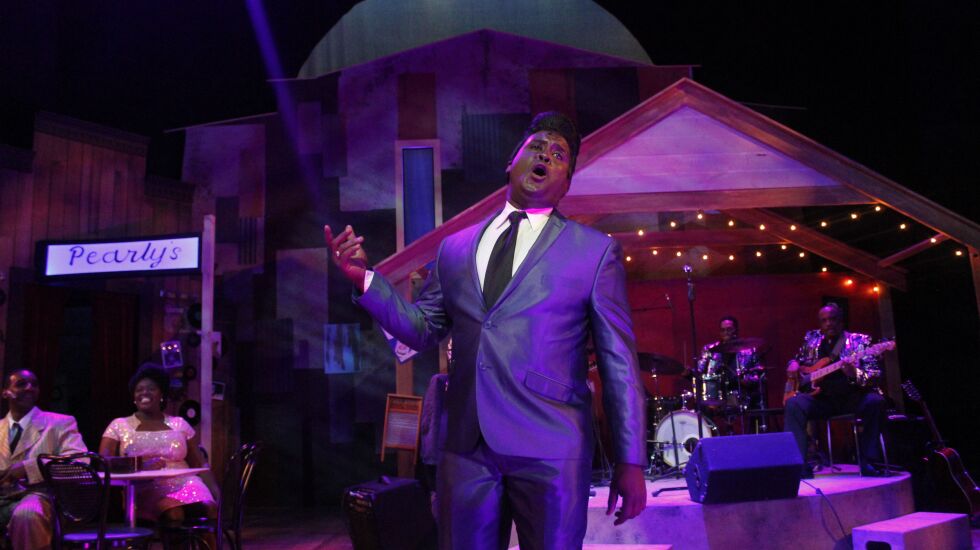
As the cast of “Blue Heaven” takes the stage in Black Ensemble Theater’s 90-minute freight train of blues music, the vibe is part juke-joint and part revival meeting.
Either way, the production — by writer-director Daryl D. Brooks — will have you stomping and singing courtesy of the all-stops-out rendition of “Let the Good Times Roll” as covered by an iconic quintet: Howlin’ Wolf (Lyle Miller), Big Mama Thornton (Miciah Lathan), Muddy Waters (Dwight Neal), Stevie Ray Vaughan (Billy Rude) and B.B. King (Aaron Reese Boseman).
In real life, the stars never performed all together. But they do at Pearly’s, the otherworldly on-stage “venue” open through Nov. 27 at Black Ensemble Theater. Backed by an unstoppable four-person band led by keyboardist Adam Sherrod, the cast delivers some two dozen numbers that capture the entire emotional spectrum filtered through the blues, from the bump and grind of Neal’s take on “Hoochie Coochie Man” to the righteous rage of Lathan’s “Hound Dog.” (Lathan prefaces the number with a teasing “Are you ready?” to the audience. No. No you are not. She’s that good.)
Brooks’ script frames the music through a motif of forgiveness. He has the legendary vocalists gathered a Pearly’s, which set designer Sydney Lynn Thomas has created as a sort of way-off-the-highway, moonlit dancehall. Between the name of the place and the repeated chatter about how “the big guy” might take in the performance at hand, it doesn’t take long to deduce Pearly’s isn’t a place anywhere near here. (The mildest of spoilers clue is right there in the show’s title.)
We are indeed in blues heaven, from the moment Miller’s Howlin’ Wolf stomps the stage with the growling, harmonica-infused opener “Smokestack Lighting.” He’s soon joined by Lathan and her killer rendition of “Little Red Rooster.”
The show’s miniscule plot takes shape with the arrival Boseman’s B.B. King. Brooks’ framing device involves the others in the band teaching King the power of forgiveness — a lesson he needs to internalize to enter the part of blues heaven that’s beyond the gates of Pearly’s. The assembled go about teaching King the concept through song and their life stories.

Brooks uses the forgiveness theme to briefly touch on cultural appropriation. “Hound Dog,” for example, was a Big Mama Thornton tune long before Elvis ever sang a note of it. But at Pearly’s, the emphasis is on letting go of the anger and making way for the celebratory concert that’s the afterlife birthright of the artists.
“Celebratory” isn’t the right word given the infinite variations on heartbreak that the blues conveys so acutely. For the first half of “Blue Heaven,” the music leans into the breakage. Rude’s “Born Under a Bad Sign” is a wave of anguish propelled with the determination of somebody who has learned how to survive it. When Neal digs into the powerful, throaty depths of “I Am the Blues,” you can feel the weight of all the world in his voice. Boseman stops the show with “There Must be a Better World Somewhere,” an alternately hopeful and despairing number that ultimately swings toward the former and ushers in a party mood.
Costume designer Marquecia Jordan helps switch things up by giving everyone a glow-up costume change, replacing the mostly muted garb of the show’s first half with a bevy of the sharp suits and bedazzled gowns. Even the band dons fancy new duds.
One of the many joys of the production lies in watching Sherrod keep that band (guitarist Oscar Brown Jr, bassist Mark Miller, drummer Myron Cherry) on point. There’s a flow of communication all but shimmering between Sherrod and the other musicians, as well as the cast members. In many Black Ensemble Theater shows, the band is high above the stage and hard to see. Here’s, it’s integrated into the onstage set and it’s to the show’s benefit. Sherrod watches the vocalists with laser focus and keeps the band’s every breath in synch. It makes for a seamless, thrillingly fluid sound.
Brooks’ dialogue mostly provides some bits of interesting biographical material, but little more. It doesn’t matter. If you’re a fan of blues, you’re a fan of this show. Scratch that. If you’re a fan of music, you’re a fan of this show.







